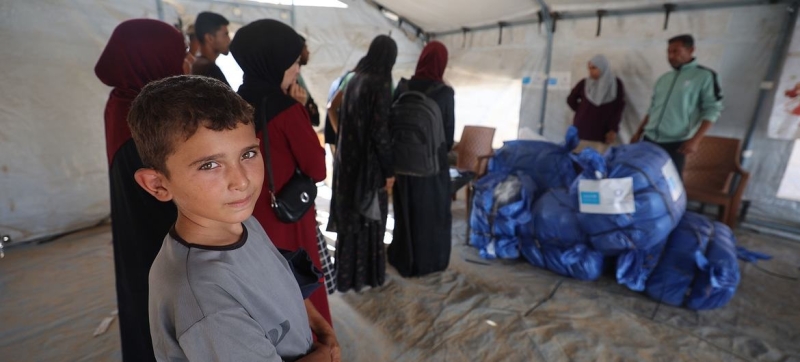- Brazil Launches Fund to Protect Forests and Fight Climate Change |
- UN Warns Conflicts Are Devastating Ecosystems Worldwide |
- Flood-hit Kurigram char residents see little hope in politics, elections |
- Air quality of Dhaka continues to be ‘unhealthy’ Friday morning |
- BNP pledges to implement signed July Charter |
Aid Blockages Persist in Gaza Despite Ceasefire, UN Says

Families receive blankets in Gaza.
The United Nations said on Thursday that Israeli authorities have rejected more than 100 requests to bring relief materials into Gaza since the ceasefire began nearly a month ago.
“Our partners report that since the ceasefire, the Israeli authorities have rejected 107 requests for the entry of relief materials, including blankets, winter clothing, and tools and materials to maintain and operate water, sanitation, and hygiene services,” Deputy UN Spokesperson Farhan Haq told journalists in New York.
He said nearly 90 per cent of the rejected requests came from more than 30 local and international non-governmental organisations (NGOs).
“More than half of the requests were denied on the grounds that the organisations were not authorised to bring relief items into Gaza,” he added.
Mr Haq stressed that such restrictions continue to hamper humanitarian efforts, even as the UN and its partners work to deliver aid under the ongoing 60-day plan.
Severe Restrictions
“The UN and our partners can do more when other impediments are lifted,” he said, noting that some rejected materials were classified by Israeli authorities as falling outside the scope of humanitarian aid or deemed “dual-use” items, such as solar panels, generators, and vehicle parts.
Despite the fragile ceasefire between Hamas militants and Israeli forces – which reportedly still control just over half of the Gaza Strip – the Office for the Coordination of Humanitarian Affairs (OCHA) continues to receive reports of military activity.
“Continued detonations of residential buildings have been reported daily in multiple areas where the Israeli military remains deployed,” Mr Haq said, citing eastern Khan Younis, eastern Gaza City, and Rafah along the southern border.
OCHA has reminded the Israeli military of its obligation “to take constant care to spare civilians, including aid workers, throughout its operations.”
Population movement across Gaza also remains fluid, with more than 680,000 people moving from southern to northern areas since the ceasefire began.
Staying in Place
However, Mr Haq said many displaced families “have reported a desire to remain in their current locations due to widespread destruction, lack of alternatives, and continued uncertainty about safety and services in their areas of origin.”
Despite these challenges, the UN and its partners have reached tens of thousands of households with food, cash assistance, and essential services.
“The impact of the humanitarian scale-up in Gaza is already clear,” Mr Haq said, “yet far more could be done if the remaining obstacles were removed.”

